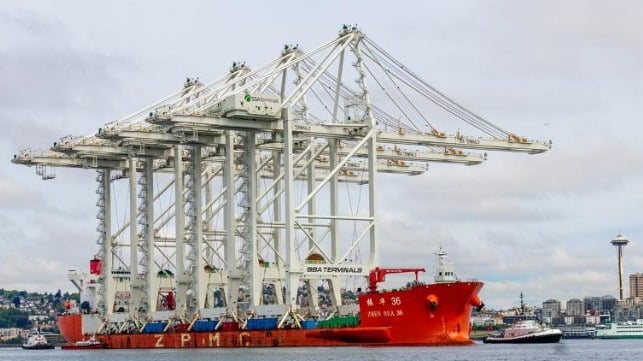The American Association of Port Authorities issued a statement responding to the media reports circulating over the past week that suggested Chinese-manufactured cranes used to move containers and other heavy cargo in ports might compromise U.S. security.
The organization which represents more than 130 public port authorities in the U.S., Canada, the Caribbean, and Latin America, called the media reports “alarmist,” and “sensationalized,” while saying it would use the attention on the industry to launch a legislative effort to restore the U.S.’s manufacturing capabilities for cranes and other heavy port equipment.
The issues made headlines after The Wall Street Journal published a report saying that unnamed “national-security and Pentagon officials” were comparing the cranes manufactured by China’s ZPMC to a Trojan horse. The report said that there was “a growing concern” that the cranes which are widely deployed any many major American ports “could be giving Beijing a possible spying tool hiding in plain sight.”
These unnamed sources highlighted the sophisticated electronics built into modern cranes saying that they feared China could capture information about materials being shipped. Questions were also raised that if the technology could provide China with remote access to the ports or even the ability to disrupt operations.
“Modern cranes are very fast and sophisticated but even they can’t track the origin, destination, or nature of the cargo,” wrote AAPA in its response to this week’s media frenzy.
The Chinese Embassy responded to The Wall Street Journal calling the reports “paranoia-driven” and efforts to further disrupt trade and economic cooperation. Reports in the government-controlled media in China went further calling this the latest example of the “delusion of persecution” among the Americans. One media report was entitled, “Hysterically laughable to think giant Chinese-made cranes could be spying tools.”
The origin of the report seems linked to a little-known clause inserted by U.S. lawmakers into the December 2022 defense authorization act. According to The Wall Street Journal, lawmakers added a requirement for the Transportation Department to consult with the defense secretary to produce a study on the issue. Specifically, they required an unclassified report “on whether foreign-manufactured cranes pose cybersecurity or national-security threats at American ports.”
AAPA highlights that it has a technical committee and a strong focus on security and safety at all ports. They cited efforts to identify and protect against any potential threats. The Association’s General Counsel said, “I like a good spy movie, but you need a smoking gun to make it a blockbuster, and there’s no smoke in this story.”
Even The Wall Street Journal admitted, “National-security officials haven’t detailed any instances of cranes being used to nefarious ends.”
Many observers are citing this as the latest wave of anti-China sentiment which has led to repeated accusations against a wave of Chinese companies. Social media platform TikTok continues to be under scrutiny with the military and many states banning the use of the app. The U.S. previously also banned the Chinese telecom company Huawei and now the efforts are targeting ZPMC, which by the company’s estimates controls 70 to 80 percent of the world market for ship-to-shore cranes. Emerging as a lower-cost alternative, and in many cases, the only viable supplier, the company’s cranes are deployed in over 100 countries.
With the backlash growing against Chinese companies, including now ZPMC, the association writes in its response to the latest issue, “Without reshoring, our domestic manufacturing capacity, legislative proposals to hastily remove cranes from U.S. ports without immediate replacements would harm U.S. supply chains, jack up prices for everyone, and exacerbate inflation even further.”
AAPA announced it would be supporting the introduction of the “Crane Reshoring and National Enforcement of Supply Chain Security Act.” They said more details on the effort which is designed to jump-start American production of port equipment would be announced at a legislative summit the association is sponsoring at the end of March.















